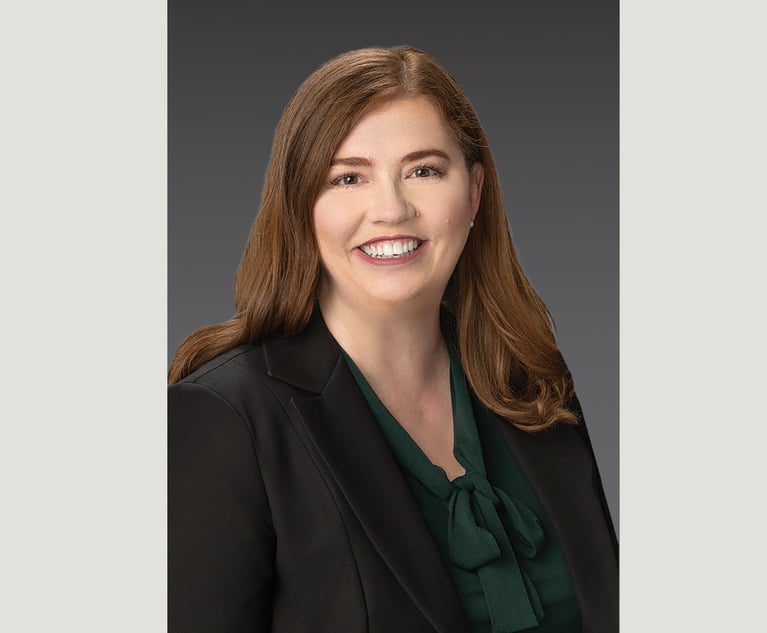 Cyber insurance can cover a range of cyber threats, from data breaches to email compromise scams to ransomware attacks.
Cyber insurance can cover a range of cyber threats, from data breaches to email compromise scams to ransomware attacks. Does Cyber Insurance Cover What You Think It Does? What In-House Counsel Need to Know
With one in three organizations ranking cyber threats as their top concern, buying insurance should help reduce risk. In-house counsel, however, are finding that cyber insurance does not always cover what's been promised.
January 24, 2023 at 01:39 PM
4 minute read
Most organizations understand how a data breach, phishing scam or ransomware attack affects the bottom line. The 2023 Allianz Risk Barometer report – a survey of risk management experts that identifies the most pressing corporate risks – finds 34 percent of responses rank cybersecurity as the number one risk.
Cyber threats have prompted companies to invest in cyber insurance to mitigate risk and protect themselves in case of a security incident. In reviewing these policies, in-house counsel will be surprised to learn that cyber insurance may not cover all aspects of cyber threats – potentially leaving the organization vulnerable following an incident.
 Scott N. Godes, partner and co-chair of the Insurance Recovery and Counseling Practice with Barnes & Thornburg
Scott N. Godes, partner and co-chair of the Insurance Recovery and Counseling Practice with Barnes & Thornburg "Based on how they're marketed, buyers think policies are designed for anything related to cyber," says Scott N. Godes, partner and co-chair of the Insurance Recovery and Counseling Practice with Barnes & Thornburg. "But the claims department is quick to say that these policies aren't a panacea for everything."
When in-house and corporate counsel consider cyber insurance, they should consider several factors, including what specific cyber incidents the policy covers. Legal leaders must also realize that language is crucial – and how the policy is written makes a significant difference.
What Do These Policies Cover, Anyway?
Cyber insurance is a burgeoning and growing market, with some predictions estimating its value at about $20 billion worldwide by 2025. In general, cyber insurance can cover a range of cyber threats, from data breaches to email compromise scams to ransomware attacks. Policies should help victimized organizations recoup the cost to restore data lost in a breach, loss of income due to business interruptions, and even certain legal expenses.
A typical policy, however, might not always cover intentional acts, or provide full coverage for social engineering attacks.
"A good standalone cyber policy should cover the costs to resolve a ransom demand, for example," says Godes. "That said, there's no standardization in cyber policies."
The list of places where carriers push back is "endless," says Godes, adding that over the last year: "Carriers are taking an astonishingly aggressive approach on how they interpret statements policyholders make in their applications."
Policy Language Matters
What companies understand the least about cyber insurance, says Godes, is pretty much everything about cyber insurance. That's because cyber, compared to any other insurance policy, is still new.
Since most companies still haven't experienced a significant attack, what's covered in the policies can be fuzzy – and that is why the policy language matters.
"Start by working with a sophisticated broker," explains Godes. "In-house counsel and others involved in decision-making should ask about the policy language."
That seems simple enough, but it's a must-have conversation because carriers don't provide the full set of policy language at the time of purchase.
In-house counsel should also ensure that carriers fully understand their firms' lines of business to offer the right policies. Indeed, communication is key.
"Sitting down and having a detailed conversation with the broker in advance of the date that the policy needs to be bound is helpful," says Godes. "A best practice for in-house counsel who know data privacy and cyber risk would be to have a tabletop exercise to discuss how policies would apply in certain situations. How would we want to proceed? What losses would the company incur? If I had a ransomware attack, where is the coverage?"
And if a claim is denied? Try to understand the rationale behind the denial – as well as that carriers rarely favor broad interpretations of coverage – and go from there. This is why in-house counsel must understand what the policy covers and how language changes affect the outcome.
"The insurance industry has made this a very difficult market in the last couple of years," says Godes. "In-house counsel need to do their homework."
Barnes & Thornburg's Insurance Recovery and Counseling practice has additional information for in-house counsel about insurance and risk.
Johanna Marmon is a writer in upstate New York who has been reporting on trends impacting the legal industry for more than 15 years.
NOT FOR REPRINT
© 2025 ALM Global, LLC, All Rights Reserved. Request academic re-use from www.copyright.com. All other uses, submit a request to [email protected]. For more information visit Asset & Logo Licensing.
You Might Like
View All
FTC's Info Security Action Against GoDaddy Sends 'Clear Signal' to Web Hosting Industry: Expert


Avoiding Legal Risks: Crafting a Strong Do Not Call Policy for Compliance
7 minute read
'Be Prepared and Practice': Paul Hastings' Michelle Reed Breaks Down Firm's First SEC Cybersecurity Incident Disclosure Report
Law Firms Mentioned
Trending Stories
- 1Public Notices/Calendars
- 2Wednesday Newspaper
- 3Decision of the Day: Qui Tam Relators Do Not Plausibly Claim Firm Avoided Tax Obligations Through Visa Applications, Circuit Finds
- 4Judicial Ethics Opinion 24-116
- 5Big Law Firms Sheppard Mullin, Morgan Lewis and Baker Botts Add Partners in Houston
Who Got The Work
J. Brugh Lower of Gibbons has entered an appearance for industrial equipment supplier Devco Corporation in a pending trademark infringement lawsuit. The suit, accusing the defendant of selling knock-off Graco products, was filed Dec. 18 in New Jersey District Court by Rivkin Radler on behalf of Graco Inc. and Graco Minnesota. The case, assigned to U.S. District Judge Zahid N. Quraishi, is 3:24-cv-11294, Graco Inc. et al v. Devco Corporation.
Who Got The Work
Rebecca Maller-Stein and Kent A. Yalowitz of Arnold & Porter Kaye Scholer have entered their appearances for Hanaco Venture Capital and its executives, Lior Prosor and David Frankel, in a pending securities lawsuit. The action, filed on Dec. 24 in New York Southern District Court by Zell, Aron & Co. on behalf of Goldeneye Advisors, accuses the defendants of negligently and fraudulently managing the plaintiff's $1 million investment. The case, assigned to U.S. District Judge Vernon S. Broderick, is 1:24-cv-09918, Goldeneye Advisors, LLC v. Hanaco Venture Capital, Ltd. et al.
Who Got The Work
Attorneys from A&O Shearman has stepped in as defense counsel for Toronto-Dominion Bank and other defendants in a pending securities class action. The suit, filed Dec. 11 in New York Southern District Court by Bleichmar Fonti & Auld, accuses the defendants of concealing the bank's 'pervasive' deficiencies in regards to its compliance with the Bank Secrecy Act and the quality of its anti-money laundering controls. The case, assigned to U.S. District Judge Arun Subramanian, is 1:24-cv-09445, Gonzalez v. The Toronto-Dominion Bank et al.
Who Got The Work
Crown Castle International, a Pennsylvania company providing shared communications infrastructure, has turned to Luke D. Wolf of Gordon Rees Scully Mansukhani to fend off a pending breach-of-contract lawsuit. The court action, filed Nov. 25 in Michigan Eastern District Court by Hooper Hathaway PC on behalf of The Town Residences LLC, accuses Crown Castle of failing to transfer approximately $30,000 in utility payments from T-Mobile in breach of a roof-top lease and assignment agreement. The case, assigned to U.S. District Judge Susan K. Declercq, is 2:24-cv-13131, The Town Residences LLC v. T-Mobile US, Inc. et al.
Who Got The Work
Wilfred P. Coronato and Daniel M. Schwartz of McCarter & English have stepped in as defense counsel to Electrolux Home Products Inc. in a pending product liability lawsuit. The court action, filed Nov. 26 in New York Eastern District Court by Poulos Lopiccolo PC and Nagel Rice LLP on behalf of David Stern, alleges that the defendant's refrigerators’ drawers and shelving repeatedly break and fall apart within months after purchase. The case, assigned to U.S. District Judge Joan M. Azrack, is 2:24-cv-08204, Stern v. Electrolux Home Products, Inc.
Featured Firms
Law Offices of Gary Martin Hays & Associates, P.C.
(470) 294-1674
Law Offices of Mark E. Salomone
(857) 444-6468
Smith & Hassler
(713) 739-1250








